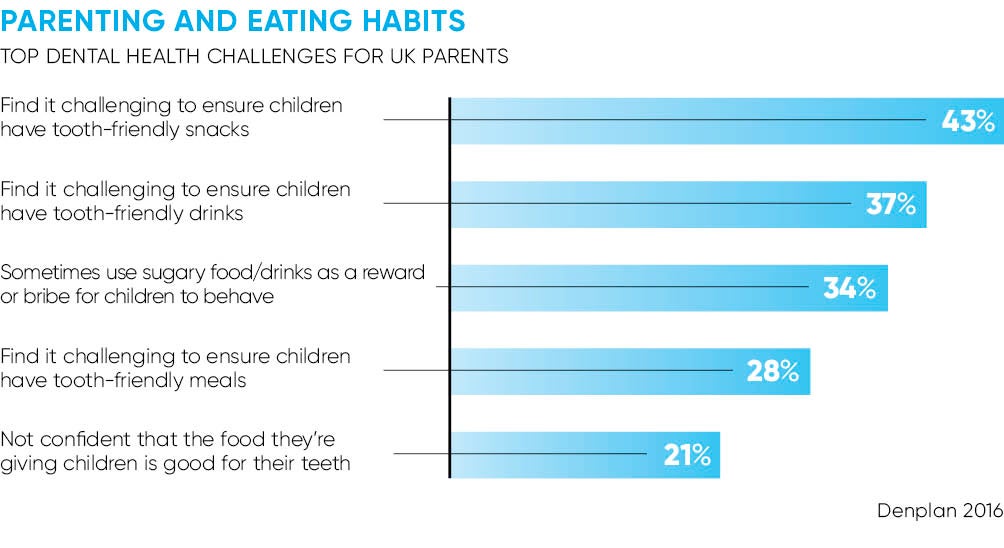Doctors are calling for health warnings on confectionary packets to reduce the huge toll of children – 34,000 in the last two years – undergoing tooth extraction under general anaesthesia.
The proposal, at the British Medical Association’s annual representative meeting in Bournemouth, highlights increasing concern about reports that half of eight year olds have visible signs of dental decay, a third of children begin school with visible signs of decay and tooth extractions in the under-fours are up by 24 per cent in the last decade to more than 9,000 a year. Rotten teeth are the single biggest reason for children needing general anaesthesia.
Who is to blame?
The food and drink industry? Government? Parents? Changing eating patterns? Schools? The answer is all these and more besides, according to dentist Dr Nigel Carter, chief executive of the Oral Health Foundation.
He says: “Putting health warnings on confectionary packets wouldn’t have a significant impact. It would be just wallpaper. How many smokers are alarmed by or react to health warnings on cigarette packs? We need to look at the real problem areas.”
Tooth decay occurs when sugar reacts with bacteria in plaque. This forms the acid that attacks the teeth and destroys the enamel. The National Diet and Nutrition Survey reported last year that children aged four to ten were consuming twice as much sugar as recommended and teenagers three times as much.
Dr Carter says: “Astonishingly, five year olds eat their weight of sugar in a year. And yet the government continues to ignore the crisis and put the wellbeing of millions at risk by bowing to pressure from the food and drink industry.”
We have been brought up to eat three square meals a day, but a BBC Good Food poll found that nine out of ten people had abandoned that advice and resorted to snacking.
Snacking up to seven times a day is not unusual. Dr Carter says: “Snacking is not good for teeth because it takes between 40 and 60 minutes for saliva to restore the acid balance in our mouths after we have eaten sugary foods and drinks – and most meals contain sugar. So the mouths of seven-times-a-day snackers take a real battering.” Child snacks often come with sugary drinks such as fruit juice and cans of Coke, which Dr Carter warns may contain 12 spoonfuls of sugar.

The Oral Health Foundation is calling upon England to follow the example of Scotland where the Childsmile programme offers young children free toothbrushes, toothpaste, two fluoride varnish applications a year and free daily, supervised toothbrushing within nurseries and schools. Childsmile is reported to be saving almost £5 million a year in treatment costs such as extractions, fillings and general anaesthesia.
Dr Carter says: “The cost of Childsmile in Scotland was recouped within five years. Wales is now rolling out a similar scheme. There are a few isolated examples of good practice in cities like Hull, Leicester and Manchester, but English health authorities have shown reluctance to invest in Childsmile despite clear evidence about the overwhelming benefits. It’s very disappointing and shocking.”
Cutbacks have left English local authorities hard pushed to implement National Institute for Health and Clinical Excellence (NICE) oral health guidelines. Many local authority oral health promotion teams have been disbanded.
A survey by the Oral Health Foundation in 2016 estimated that almost four million under-14s in the UK are at risk from serious dental problems because of inadequate toothbrushing supervision.
More than one in three of the parents (37 per cent) said they stopped supervising their children’s brushing before the age of seven. NHS guidelines advise parental supervision up until at least the age of seven. One eminent expert recently went a step further. Nigel Hunt, of the Royal College of Surgeons, advised parents to brush children’s teeth, or at least supervise cleaning, until their permanent teeth are in place, at about the ages of 11 or 12.
This presupposes that parents know how to clean their own teeth properly, but many fail this test. Dr Carter says: “It’s the case of the blind leading the blind. Most people spend about 45 seconds cleaning their teeth.” Recommended cleaning time is two minutes, twice a day, including last thing at night.
Stopping children from becoming overweight by restricting sugar consumption could have a major knock-on effect on dental health, but Dr Carter described the government’s Childhood Obesity Strategy (COS) as “an absolute disaster which will lead to another generation of children with unnecessary oral health problems”.
He is not alone. The British Medical Association accused the government of “rowing back on promises”, while TV chef Jamie Oliver complained that proposals for food companies to reduce sugar levels in products were voluntary not mandatory.
The COS report says: “The food and drinks industry will be challenged to reduce overall sugar across a range of products that contribute to children’s sugar intakes by at least 20 per cent by 2020.”
Campaigners have welcomed clampdowns restricting junk food advertising on children’s TV programmes and in media where children make up 25 per cent of the audience, but children are still exposed to junk food adverts in family TV programmes. Doctors argue that since obesity kills as decisively as lung cancer, junk food advertising should be banned just like cigarette advertising.
But Dr Carter says that an advertising ban would not prevent retailers from positioning unhealthy food at child-high level. Does this point to a future where it may assume a kind of “top-shelf” status, like for soft-porn magazines, beyond the reach of tiny hands?
Who is to blame?


